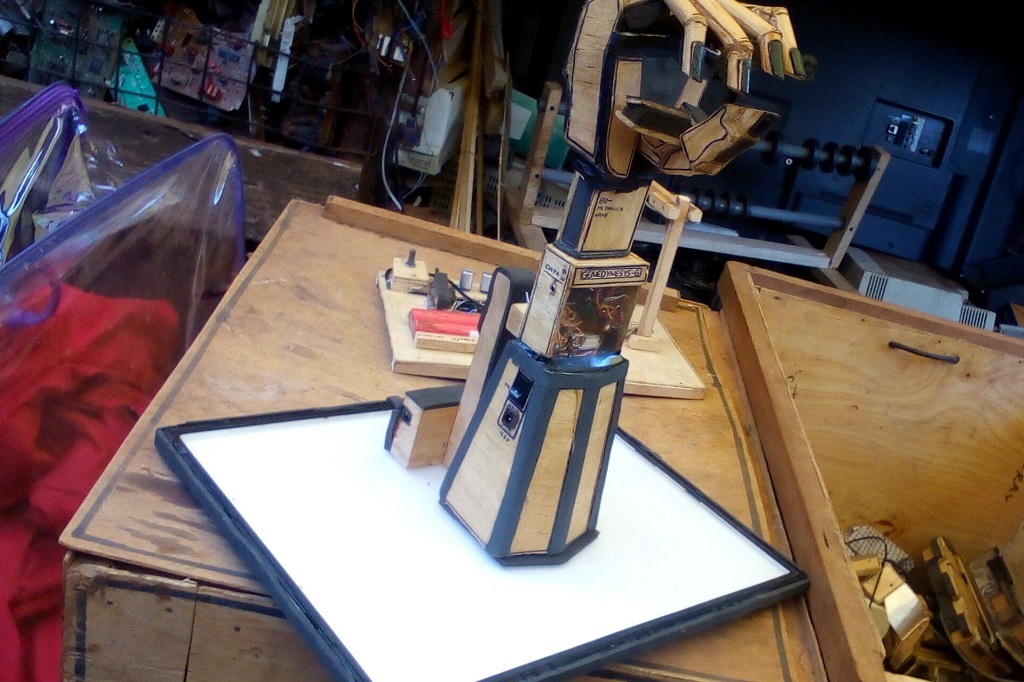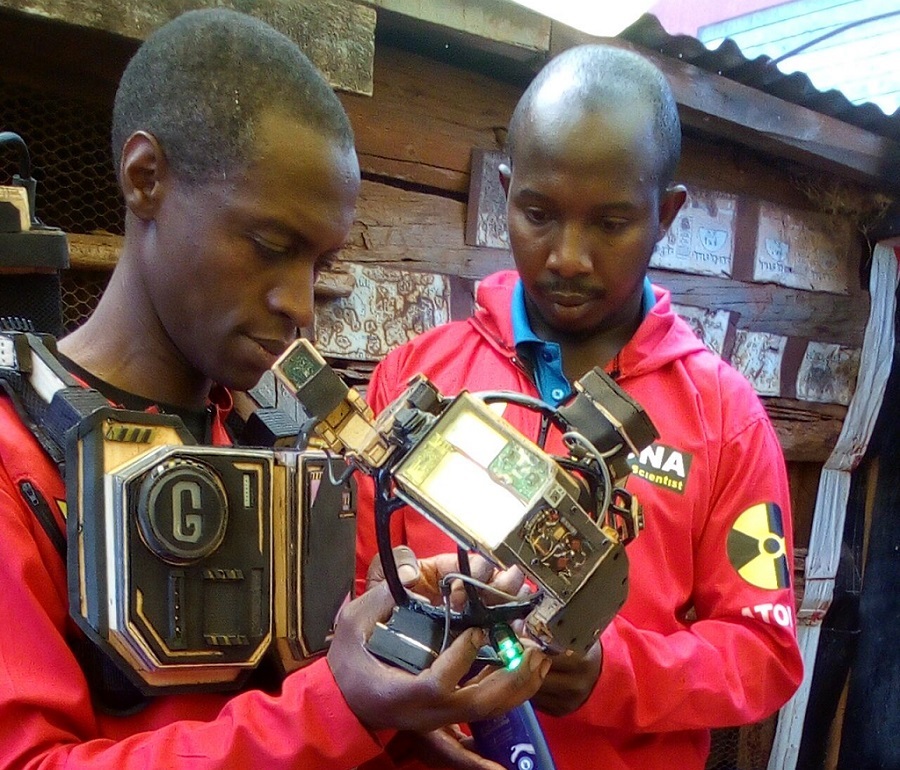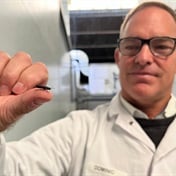
- Two Kenyan cousins are making robotic limbs out of recyclables for people with disabilities.
- The robotic device can receive brain signals through a headset to enable movement.
- The innovators want to perfect their device, but funding is a challenge.
- For climate change news and analysis, go to News24 Climate Future.
In the suburbs of Kikuyu in Kenya's Kiambu County, 29-year-old Moses Kiuna and his cousin David Gathu are fiddling with wires and electric cables in their workshop, their grandmothers' former granary.
They've been doing this since they were children – dismantling toys, radios and TV sets, despite the spankings their fiddling attracted from their parents. Today, however, their tinkering is a lot more advanced.
The cousins are making robots that can assist people with disabilities perform simple tasks without assistance, and they already have two prototypes under their belt. Their desire to create assistive technology started in 2009 when they decided to try and help a classmate who had been born without a hand.
"We had a friend who was a congenital amputee and had one hand. We would see him struggle to write, eat and do other things that other children did with ease. It's then that we began asking ourselves how we could help him, and others, move from being dependent to independent persons," said Kiuna.
READ | Cameroon's electronic waste recyclers struggle despite historic law
Their early experiences have developed into an insatiable appetite for robotics, and they haven't looked back.
The self-taught innovators began studying the science behind how the brain sends signals to the nervous system in order for motor activity to occur. Armed with this knowledge, they developed a robotic prosthetic that functions like a human hand to aid people who've lost arms due to accidents, illnesses or congenital disabilities.
The assistive device is worn on the head and back of the affected person to enhance communication between the brain and the prosthetic arm.
"The gadget uses brain signals received from the headset receiver and converts the user's intentions into actions performed by the robotic arm. Decisions are transmitted by electric currents from one cell to another and are translated into various movements," Gathu explained.
The cousins carefully arranged the components in electronic gadgets so that the output would make a circuit. They then made a wood carving mimicking the human hand, complete with various joints. After many attempts, they devised a prototype that uses electric signals to control the prosthetic arm's movements.
The device can facilitate movement along the shoulder, elbow and wrist. It can also assist in moving the hand up and down, grabbing and releasing, picking up a drink, opening a door, turning the lights on and off, and performing other simple tasks that it's been programmed to perform.
According to Gathu, the robot's movements are limited because of the materials it's made of. He said he was optimistic that they could make a more durable, fashionable and flexible device with the appropriate materials. They said they were still perfecting the device, but added that the lack of funding was a challenge.
To accommodate people who've lost their mobility from the neck down or who have developed quadriplegia due to accidents or disease, they've also invented a robot with a human interface that uses artificial intelligence.
Nicknamed Jeff, the robot receives commands in English and Swahili and can respond accordingly. The robot can be placed on a surface or mounted on a wall.
"We had our fellow Africans in mind when we programmed Jeff in Swahili in order to serve the people in the region who don't speak English. We also intend to programme some in our local languages," Kiuna explained.
Like the prosthetic arm, Jeff is also made of recycled electronic waste materials, leather and wires that the cousins buy from repair shops or collects from dumpsites.
READ | When art meets activism: Mbongeni Buthelezi turns plastic waste into creative solutions
And although they admit that they're proud of how far they've come towards making their dream a reality, some impediments still stand in their way.
"Access to cutting-edge equipment and materials that can graft plastics or aluminium and enable us to design a hand that is similar in function to the real hand would make a lot of difference," Gathu said.
They also believed they could do more with a regular workshop. Operating out of their grandmother's granary, their equipment is often damaged.
The first robot they made – which took them two years to put together – was rained on, and they had to remake it from scratch.
They also said that although some organisations offered to partner with them, the terms of agreement had not been palatable because it required them to give up ownership of their innovation.
"Some learning institutions have asked us to give up the innovation in exchange for an opportunity to pursue higher education, but we don't think it's worth it, considering we've taught ourselves what we know about robotic technology so far," Kiuna said.
Their dream is to have a research centre that will bring together creative minds from various fields, especially in designing robotic devices that are durable, fashionable and flexible – and that can be competitive worldwide.
Their grandmother Mary Kabura said she was proud of the young men and had given them a small portion of her land where they could put up a modern workshop should they get resources.
"I'm impressed by their dedication and desire to meet a need in society. I have given them this small piece of land to set up their workshop, and I hope to see their robots launched in the market one day," she said.
READ | In Nigeria, some businesses find value in waste recycling
Gathu and Kiuna believe their innovations can be game changers for persons living with disability and hope that their company, Afro-Genesys, will one day be mentioned alongside giants in the robotics industry.
Over the past year, several African ventures have stepped into the field of robotics. Uniccon Group, an Abuja-based tech start-up, recently unveiled Africa's first humanoid robot, Omeife.
The launch of Omeife came a few months after Abdul Malik Tejan-Sie, a South-African-based Sierra Leonean innovator, presented a prototype of South Africa's first humanoid robot.
A 2021 Government AI Readiness Report ranked Mauritius, South Africa, Kenya, Ghana and Cape Verde as the most accommodating and prepared for AI uptake on the continent, while the United Nations Economic Commission for Africa (ECA) estimates that Africa's economy could hit US$15.7 trillion by 2030 if the continent adjusts and taps into 10% of the global AI market.
Early in 2022, the ECA opened the African Research Centre on Artificial Intelligence at the Denis Sassou-N'Guesso University of Kintélé in the Republic of the Congo. The centre offers training in the areas of AI and robotics and offers a master's degree in artificial intelligence and data science to African students.
- bird story agency




 Publications
Publications
 Partners
Partners













